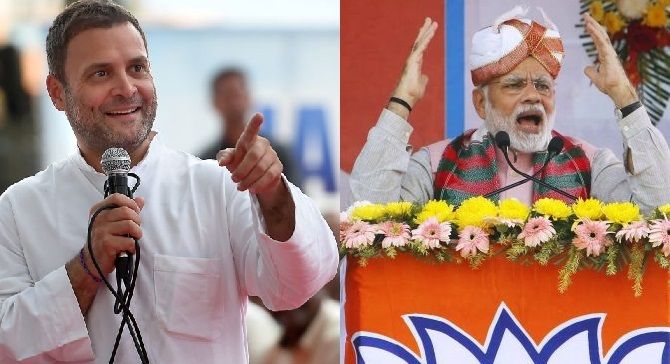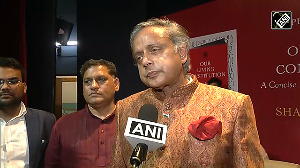'Even if the Congress bags two of the three heartland states in the assembly round, the BJP may still get the majority of Lok Sabha seats in these states,' predicts T N Ninan.

It is inevitable that the results of the assembly elections in the three heartland states of Madhya Pradesh, Rajasthan and Chhattisgarh will be seen as a foretaste of the Lok Sabha election, due six months hence. But the pundits had better be careful, for state and national elections should not be conflated.
In particular, there is the Modi factor in a parliamentary election, which is what helped the Bharatiya Janata Party corner a higher share of the popular vote in Lok Sabha 2014 compared to the assembly elections six months earlier in 2013.
This time, too, the assembly elections are influenced heavily by state-level issues like regional drought, while the Lok Sabha election can be expected to be more of a leader-influenced contest -- a repeat of 2014.
Simply put, the BJP is on a better wicket in parliamentary elections than in state elections.
The general drift of current punditry is that the Congress is ahead in Rajasthan, while locked in close contests with the BJP in MP and Chhattisgarh. If correct, this would mean a substantial shift in voter behaviour when compared to the last round of assembly elections in these states, in 2013.
But it remains an open question how much of a difference that would make when it comes to the parliamentary elections in May.
The numbers tell the story. In 2013, the BJP got 45 per cent of the assembly vote in MP, the Congress 36 per cent. A 4 to 5 per cent swing in voting behaviour could mean a big change from the 2013 seat tally of 165 to the BJP and 58 to the Congress.
The question is, would that change the picture for the Lok Sabha polls? Perhaps not, for two reasons: First, the BJP got a much bigger share (55 per cent) of MP's popular vote in Lok Sabha 2014 while the Congress vote took a marginal dip.
A 5 to 7 per cent swing towards the Congress will not make much difference in May: The BJP will still be well ahead. It won't bag 26 of 29 seats, as in 2014, but it could walk away with the lion's share.
It could be a different story in Rajasthan where, in the 2013 assembly elections, the voting split was 45 per cent for the BJP and 33 per cent for the Congress. A few months later, in the Lok Sabha elections, the BJP vote share was up to 51 per cent while the Congress share dipped to 30 per cent.
If the pundits are right, that the Congress is well ahead in the current assembly election, implying a vote swing of perhaps 8 to 10 per cent away from the BJP, it would be enough to make a difference in the Lok Sabha elections as well though the contest would be closer in May than now.
Certainly, the 25-to-0 seat split of 2014 will not be repeated.
What of the third state, Chhattisgarh? In 2013, the BJP-Congress contest was almost a tie. The BJP got 41 per cent of the vote and the Congress 40 per cent, enough of a difference to give the BJP got the majority of seats.
But when it came to the 2014 Lok Sabha elections, the vote split was a more divergent 49 to 38, and the BJP bagged 10 of the 11 seats.
If the current assembly contest is too close to call, and the Modi factor operates in May, it could signal a healthy BJP performance in the parliamentary elections.
The bottom line is this: If the voting pattern in the current round of assembly elections turns out to be as predicted by polls and pundits, with a swing towards the Congress in Madhya Pradesh and Rajasthan, that need not automatically mean a similar outcome in these states and Chhattisgarh when parliamentary elections come round in May.
Even if the Congress bags two of the three states in the assembly round, the BJP may still get the majority of the Lok Sabha seats in these states, though nowhere near the one-sided 2014 score of 61 out of 65.







